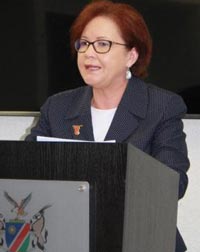
US government equips health facilities with advanced techniques to detect and prevent cervical cancer

The United States, through the President’s Emergency Plan for Aids Relief (PEPFAR) and technical assistance from the U.S. Centers for Disease Control and Prevention (CDC) has equipped health facilities in Katima Mulilo and across the country with advanced techniques to detect and prevent cervical cancer.
Cervical cancer is the second most common form of cancer among women in Namibia, The US Embassy said in a statement.
US Ambassador to Namibia Lisa Johnson encouraged at-risk women to screen for cervical cancer when she visited the Bukalo Health Centre in the Zambezi region on 22 August.
“Women in Zambezi no longer have to travel long distances, or wait for long periods of time, to be screened and to receive treatment for one of the most dangerous cancers affecting women in Namibia,” Ambassador Johnson said.
During the visit, Ambassador Johnson praised the Ministry of Health and Social Services for effective implementation of these advanced “screen and treat” procedures now available in Katima Mulilo and 34 other health facilities across Namibia.
This “screen and treat” procedure, introduced in September 2018, allows immediate diagnosis at clinics that offer the procedure to determine if a women has pre-cancerous cells on the cervix, and to receive treatment during that same clinical visit.
PEPFAR has trained nearly 100 health care workers in Namibia to provide the “screen and treat” procedure.
According to the Embassy, PEPFAR is committed to ongoing support of the cervical cancer screening programme with a continuing national rollout of screening services.
Over the next year, an additional 18 health care facilities across Namibia will be equipped to offer this advanced cervical cancer screening service, the embassy added.
Caption: Bukalo Clinic: US Ambassador Lisa Johnson with staff from the Bukalo Health Centre in the Zambezi Region where she encouraged at-risk women to screen for cervical cancer.













































